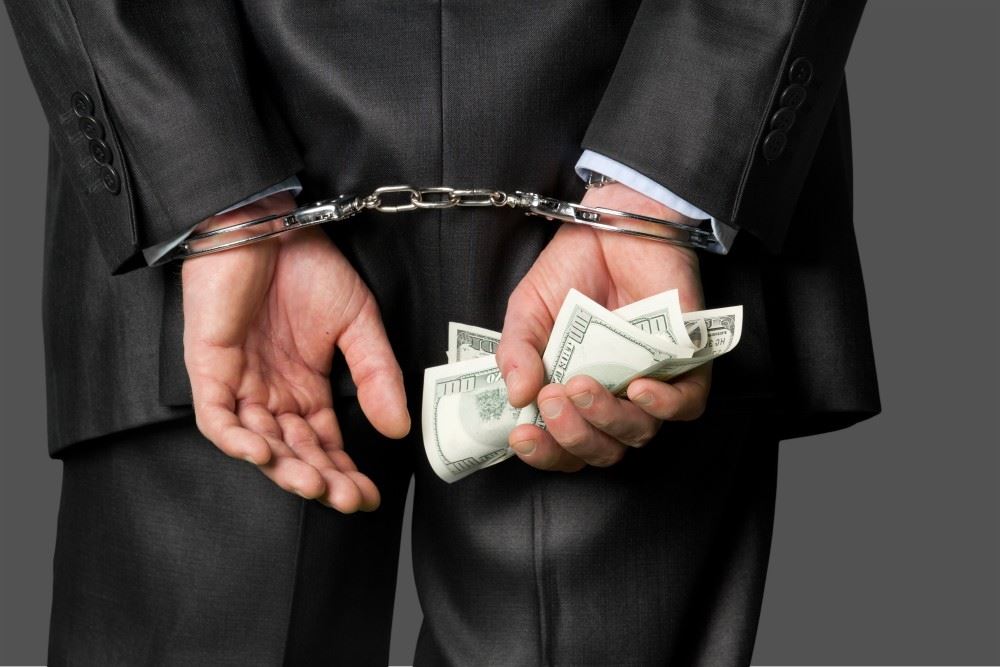“White collar crimes” are usually financially motivated. Investigations and prosecutions of white collar crimes often target professionals working in “white collar” jobs or people who hold public office.
It is a broad topic that covers a wide range of criminal offenses under both federal and state laws. Below, we will look at an overview of white collar crimes in SC, including:
- What “white collar crime” means,
- Examples of white collar crime in SC state courts,
- Examples of white collar crime in SC federal courts, and
- Examples of the potential penalties for white collar crime.
What are White Collar Crimes in SC?
There is a broad range of misconduct that is included in what most consider white collar crime, but the common thread is that these are financial crimes committed by “white collar” individuals like businesspeople, bankers, or public office holders.
They (usually) don’t involve violence, drugs, or property damage, like other state and federal crimes. Rather, they involve some form of fraud, theft, or political corruption. White collar crime defendants are often corporate officers, businesspeople, or public officials whose reputations and careers are on the line even if they avoid prison time.
Are White Collar Crimes Charged in State Court or Federal Court?
White collar crimes can be charged in either SC state court or in federal court, depending on whether federal jurisdiction exists and which agency is conducting the investigation.
Although financial crimes like breach of trust, forgery, and credit card fraud are common in state court, “white collar crimes” that involve fraud or public corruption are more commonly charged in the federal courts.
Examples of White Collar Crimes in SC
Below, we will take a look at some examples of white collar crimes in both SC state court and SC federal court, and the potential penalties for white collar crimes.
White Collar Crimes in SC State Court
Embezzlement of Public Funds: Embezzlement of public funds is a specific type of breach of trust in SC, which applies to “an officer or other person charged with the safekeeping, transfer, and disbursement of public funds.”
The potential penalties for embezzlement of public funds also depends on the dollar value of the money taken:
- $10,000 or more: up to ten years in prison (felony), or
- Less than $10,000: up to five years in prison (felony).
Any person convicted of embezzlement of public funds is also barred from holding public office in the state, unless the General Assembly removes the prohibition by a 2/3 vote.
Money Laundering
Although most money laundering cases are charged in the federal courts, SC also has comprehensive money laundering laws that include penalties for:
- Conducting financial transactions that involve proceeds from unlawful activity, or
- Transporting, transmitting, or transferring a monetary instrument to or from a place in the state of SC with the intent to commit unlawful activity or with the intent to conceal proceeds from unlawful activity.
The penalties for money laundering in SC state court are based on the amount of money involved:
- More than $300 but less than $20,000 in a 12-month period: up to five years in prison,
- More than $20,000 but less than $100,000 in a 12-month period: up to ten years in prison, and
- $100,000 or more in a 12-month period: up to 20 years in prison.
For a first offense, the penalties may also include a fine of up to $250,000 or twice the value of the transactions, whichever is greater, and, for a second offense, the penalties may also include a fine of up to $500,000 or five times the value of the transactions, whichever is greater.
Tax Evasion
SC also has state-court penalties for tax evasion that include:
- Up to five years in prison for willfully attempting to avoid state taxes or property assessments,
- Up to five years in prison for a person who is required to collect taxes who fails to collect, account for, and pay over any tax required by SC law,
- Up to one year in prison for any person who fails to pay an estimated tax or who fails to file a tax return, keep records, or supply information that is required by law,
- Up to one year in prison for willfully making false statements about taxes when required to make a statement under SC law,
- Up to one year in prison for failing to provide the required information to an employer about tax withholdings or for providing false information to an employer,
- Up to five years in prison for making a false statement, return, or other document that is verified by a written declaration that it is made under penalty of perjury, and
- Up to five years in prison for assisting someone in preparing a fraudulent tax return.
Breach of Trust with Fraudulent Intent: Breach of trust is SC’s embezzlement statute. The state must prove that you:
- That were entrusted to you for someone else’s benefit,
- Converted the funds to your own use, and
The potential penalties for breach of trust in SC depend on the dollar value of the money taken:
- $10,000 or more: up to ten years in prison (felony),
- Less than $10,000 but more than $2000: up to five years in prison (felony), or
- $2000 or less: up to 30 days in jail (misdemeanor).
Other Financial Crimes in SC State Court
Credit Card Fraud: There are various crimes under SC law that fall under the “umbrella” of credit card fraud, and two or more are often charged at the same time depending on the facts of the case.
These may include:
- Financial transaction card theft,
- Financial transaction card forgery,
- Financial transaction card fraud,
- Possession of financial transaction card forgery devices, and
- Receiving goods or services that were obtained by credit card fraud.
The potential penalties for credit card fraud crimes in SC range from a maximum sentence of one year in prison to a maximum sentence of five years in prison, depending on the facts of the case.
Forgery: Forgery in SC covers a wide range of conduct and could mean forging or counterfeiting any writing or instrument of writing, publishing a forged document (for example, by presenting a forged check to a store clerk), forging or altering a record or land plat, causing someone else to do any of the above, or helping someone else to do any of the above.
Forgery in SC is punished based on the dollar value of the forgery:
- $10,000 or more: up to ten years in prison (felony),
- Less than $10,000: up to five years in prison (felony), or
- No dollar value: up to three years in prison (misdemeanor).
White Collar Crimes in SC Federal Court
Most “white collar crimes” are charged in the federal courts, including various types of fraud cases, money laundering, and public corruption cases. Common examples of federal white collar crimes cases include:
- Mail Fraud and Wire Fraud: when someone uses the US mail or wire transfers (like Western Union or bank transfers) to commit fraud,
- Healthcare Fraud: often involves overbilling or double-billing for equipment or services provided or billing for services that were not provided,
- COVID-19 Fraud: includes fraud such as businesses or individuals applying for COVID-19 relief funds or Paycheck Protection Program loans for non-existent businesses, or supplying false information to inflate the amount of financial aid the individual or business is eligible to receive,
- Campaign Finance and Ethics Violations: Violations of election laws and campaign finance violations that may result in reputational damage or criminal charges,
- Money Laundering: financial transactions that involve proceeds from illegal activity or that are designed to cover up proceeds from illegal activity, including “structuring,” or breaking up deposits into amounts less than $10,000 to avoid the federal reporting requirements,
- Securities Fraud: includes a broad range of fraudulent conduct intended to defraud investors through misrepresentations, inflate the value of stocks, trading based on confidential information, or unauthorized trading,
- Bank Fraud: covers a wide range of conduct that includes accounting fraud, bank card fraud, fraudulent loan applications, or check fraud,
- Corporate Fraud: There are many types of corporate fraud that include embezzlement, falsifying or withholding information to investors, accounting fraud, bankruptcy fraud, or ponzi schemes. Note that, under the “responsible corporate officer doctrine,” there is a presumption that a high-ranking corporate officer is aware of illegal activity committed by a corporation, and a corporate executive can be found guilty of crimes that they did not know about,
- Extortion, Bribery, and Public Corruption: Bribery, kickbacks, or other gifts intended to influence a public official’s actions can be charged under various federal statutes including the Hobbs Act, the Honest Services Provision, the Racketeer Influenced and Corrupt Organizations Act (RICO), the Foreign Corrupt Practices Act (FCPA), and mail fraud and wire fraud laws,
- Conspiracy: Regardless of the underlying charge, federal prosecutors usually add a conspiracy count whenever two or more individuals are involved in a fraudulent scheme because it allows for the admission of additional evidence (statements of co-conspirators, for example) and makes it easier for federal prosecutors to get a conviction.
Penalties for White Collar Crimes in Federal Court
Sentencing in the federal court is very different from sentencing in SC state courts. Although each federal statute has a penalty range that may include mandatory minimum sentences, the sentence that a defendant receives is based on the federal sentencing guidelines.
Whether there is a guilty plea or a conviction after trial, the sentence is determined by 1) the defendant’s offense level and 2) the defendant’s criminal history category. The base offense level is determined by the crime charged, but it is then modified up or down (usually both) by factors including:
- The loss amount – an estimation of the total amount of money that was involved in the fraudulent activity over time,
- Offense level enhancements that are case-specific such as when the defendant’s fraudulent activity targeted a vulnerable population like the elderly,
- Offense level reductions like the two-level reduction for acceptance of responsibility,
- Variances that allow the court to deviate (up or down) from the guidelines range, and
- 5K1 downward departures for substantial assistance (giving information or testifying against other defendants).
Questions About White Collar Crimes in SC?
If you have been charged with a white collar crime in SC state or federal court, have received a subpoena for grand jury testimony in the federal court, or have received a target letter from the US Attorney’s Office, contact the SC white collar crimes attorneys at Templeton, Mims & Ward at (843) 891-6100 or by sending us an email through our website to set up a consultation and find out how we can help.


